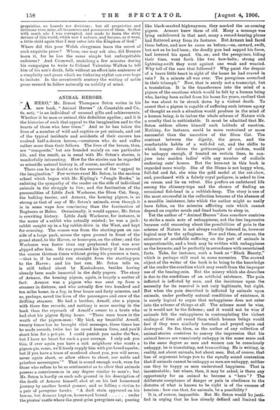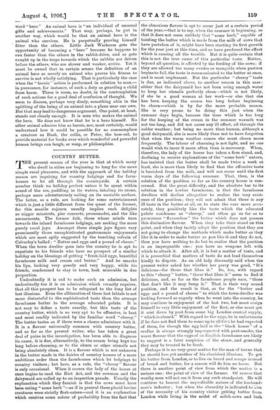ANIMAL HEROES.
"A HERO," Mr. Ernest Thompson Seton writes in his new book, "Animal Heroes" (A. Constable and Co., 6s. net), "is an individual of unusual gifts and achievements. Whether it be man or animal, this definition applies ; and it is the histories of such that appeal to the imagination and to the hearts of those who hear them." And so he has taken the lives of a number of wild and captive or pet animals, and out of the typical incidents and accidents of their careers has evolved half-a-dozen heroes,—creatures who do and suffer rather more than their fellows. The lives of the heroes, thus, are "composite," but are founded mainly on one particular life, and the result, as is usual with Mr. Seton's stories, is wonderfully interesting. How far the stories can be regarded as scientific natural history is, of course, another matter.
There can be no doubt as to the success of the "appeal to the imagination." Few writers excel Mr. Seton, in the modern school which began with Mr. Kipling's "Jungle Books," in enlisting the sympathy of the reader on the side of individual animals in the struggle to live ; and the fascination of the personalities of Little Jack Warhorse, the Slum Cat, Snap, the bulldog terrier, and Arnaux, the homing pigeon, is as strong as that of any of Mr. Seton's animals, even though it is in some ways less convincing than the fascination of Bagheera or Baloo. Occasionally, it would appear, Mr. Seton is rewriting history. Little Jack Warhorse, for instance, is the name of a rabbit who actually existed; he was a jack- rabbit caught up in a big rabbit-drive in the West, and kept for coursing. The course was from the starting-pen on one side of a large park, across the open ground in front of the grand stand, to the Haven, or home-pen, on the other; and the Warhorse was faster than any greyhound that was ever slipped after him. He was promised his liberty if he covered the course thirteen times without giving his pursuers a turn, —that is, if he could run straight from the starting-pen to the Haven ; and his last run, Mr. Seton tells us, is still talked about by Kaskadoans, besides having already been made immortal in the daily papers. The story of Arnaux, the homing pigeon, again, is largely a matter of fact. Annuls was a pigeon who was sent up from a steamer in distress, and who actually flew two hundred and ten miles home, in a fog, in four hours and forty minutes, and so, perhaps, saved the lives of the passengers and crew of the drifting steamer. He had a brother, Arnolf, also a pigeon with three fine records, and nothing is more moving in the book than the reproach of Arnolfs owner to a brute who had shot his pigeon flying home. "There were tears in the wrath of the pigeon-man : 'My bird, my beautiful Arnolf, twenty times has he brought vital messages, three times has he made records, twice has he saved human lives, and you'd shoot him for a pot-pie. I could punish you under the °law, but I have no heart for such a poor revenge. I only ask you this, if ever again you have a sick neighbour who wants a pigeon-pie, come, we'll freely supply him with pie-breed squabs ; but if you have a trace of manhood about you, you will never, never again shoot, or allow others to shoot, our noble and priceless messengers.'" That is sound enough work, even for those who refuse to be so sentimental as to allow that animals possess a consciousness in any degree similar to man's ; but Mr. Seton is hardly on such safe ground in his description of the death of Arnaux himself, shot at on his last homeward journey by another brutal gunner, and so falling a victim to a pair of peregrine hawks. "A dark stain appeared on his
bosom, but Arnaux kept on, homeward bound under the pirates' castle where the great grim peregrines sat; peering
like black-masked highwaymen, they marked the on-coming pigeon. Arnaux knew them of old. Many a message was lying undelivered in that nest, many a record-bearing plume had fluttered away from its fastness. But Arnaux had faced them before, and now he came as before,—on, onward, swift, but not as he had been; the deadly gun had sapped his force, had lowered his speed. On, on; and the peregrines, biding their time, went forth like two bow-bolts; strong and lightning-swift they went against one weak and wearied. Why tell of the race that followed ? Why paint the despair of a brave little heart in sight of the home he had craved in vain P In a minute all was over. The peregrines screeched in their triumph." Now, that is surely not a transcript, but a translation. It is the transference into the mind of a pigeon of the emotions which would be felt by a human being who, having been exiled from his home for years, realised that he was about to be struck down by a violent death. To assert that a pigeon is capable of suffering such intense agony of thought as such a situation would produce in the mind Of a human being, is to imbue the whole scheme of Nature with a cruelty that is unthinkable. It must be admitted that Mr. Seton seldom allows himself such latitude of emotion. Nothing, for instance, could be more restrained or more successful than the narrative of the Slum Cat. The contrast between the dignity, the grace, and the comfortable habits of a well-fed cat, and the shifts to which hunger drives the guttersnipes of catdom, would be unhappy enough, if treated on certain lines, to con- jure into maiden ladies' wills any number of codicils endowing cats' homes. But the hero-cat in this book is regarded more wisely. She of the Slums is not happy when, full-fed and fat, she wins the gold medal at the cat-show, and, purchased with a falsely royal pedigree, is asked to live on cream and lie on velvet. She prefers an unfettered life among the chimney-tops and the chance of finding an occasional fish-head in a rubbish-heap. The story is one of the most successful in the collection because of the absence of a maudlin insistence, into which the author might so easily have fallen, on the miseries afflicting cats which cannot depend on regular meals and lined baskets to sleep in.
Yet the author of "Animal Heroes" does somehow contrive to strike a main note of unhappiness, not the less impressive because cold reasoning about the possibilities of pain in the scheme of Nature is not always readily listened to, however logical may be the syllogisms. Now and then, of course, the existence of avoidable suffering on the part of animals is unquestionable, and a book may be written with unhappiness as the keynote, and be perfectly in accordance with ascertained facts. Take, for instance, such a book as "Black Beauty," which is perhaps still read in some nurseries. The avowed object of the writer of the book is to bring to the knowledge of the reader the cruelties which may result from the improper use of the bearing-rein. But the misery which she describes is due to the conditions of an artificial existence. The pain inflicted is inflicted by man, and the insistence upon the necessity for its removal is not only legitimate, but right. But when the pain described is inflicted by animals upon animals, under perfectly natural conditions of existence, it is surely logical to argue that unhappiness does not enter into the scheme of things at all. The scheme must be wise, or it would not be the Scheme ; and it would not be wise if animals felt the unhappiness in contemplating the violent endings of lives all round them which human beings Would feel if they were similarly tortured and preyed upon and destroyed. So far, then, as the author of any collection of animal-stories contrives to convey the impression that his animal heroes are consciously unhappy in the same sense and to the same degree as men and women can be consciously unhappy, he is translating, not transcribing. He is writing, in reality, not about animals, but about men. But, of course, that line of argument brings you to the equally sound contention that if animals cannot be unhappy as men are unhappy, neither can they be happy as men understand happiness. That is incontestable; but where, then, it may be asked, is there any opportunity for an animal to become a "hero" ? The deliberate acceptance of danger or pain in obedience to the dictates of what is known to be right is of the essence of heroism : how can that, for animals, be a possibility ?
It is, of course, impossible. But Mr. Seton would ha justi- fied in urging that he has already defined and limited the word "hero." Ai animal hero is "an individual of unusual gifts and achievements." That may, perhaps, be put, in another way, which would be that an animal hero is the animal who survives. He is perpetually proving himself fitter than the others. Little Jack Warhorse gets the opportunity of becoming a "hero" because he happens to -run faster than the others in the rabbit-drive, and so gets caught up in the traps towards which the rabbits are driven before the others, who are slower and weaker, arrive. Yet it must be owned that in certain senses the definition of an animal hero as merely an animal who proves his fitness to survive is not wholly satisfying. That is particularly the case when the "heroic" action is performed in relation to man,— in pursuance, for instance, of such a duty as guarding a child from harm. There is room, no doubt, in the contemplation of such actions for a good deal of confusion of thought. We seem to discern, perhaps very dimly, something akin in the uplifting of the being of an animal into a plane near our own. But that may lead to dangerous argument. One point, at least, stands out clearly enough. It is man who makes the animal the hero. He does not know that he is a hero himself. No other animal admires him as heroic, nor, most certainly, would understand how it could be possible for so commonplace a creature as Dash, the collie, or Peter, the tom-cat, to provide material for books over which wonderful and powerful human beings can laugh, or weep, or philosophise.







































 Previous page
Previous page